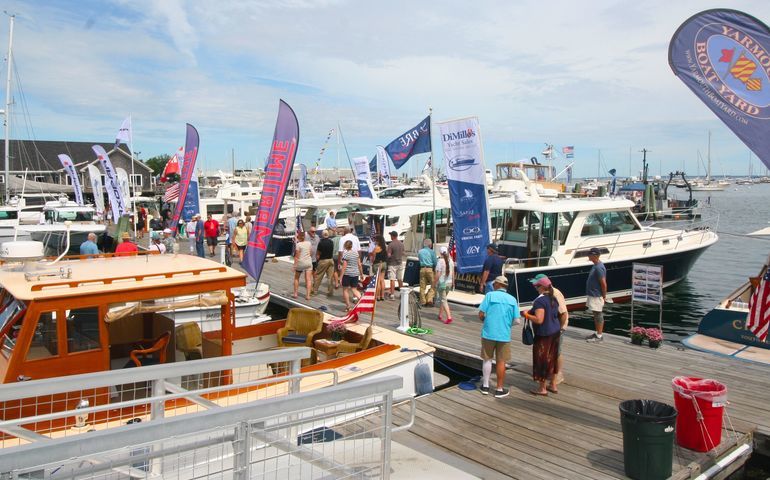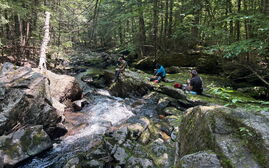
Rockland to close Main Street to traffic to spur shopping
 PHOTO / LAURIE SCHREIBER
The Rockland City Council has agreed to close Main Street to allow merchants to sell outside as a way to recoup some of the losses from COVID-19, including cancellation of this year's Maine Boat & Home Show, which draws thousands to the city in August.
PHOTO / LAURIE SCHREIBER
The Rockland City Council has agreed to close Main Street to allow merchants to sell outside as a way to recoup some of the losses from COVID-19, including cancellation of this year's Maine Boat & Home Show, which draws thousands to the city in August.
Rockland City Council agreed to close Main Street to traffic in some form during June, an experiment they hope will at least help businesses struggling through the pandemic, and at best possibly transform the city long-term.
The City Council voted unanimously to make the move, which must be approved by the Maine Department of Transportation, since Main Street is also U.S. Route 1. Councilors also agreed to form a task force made up of business representatives, city officials and others to tweak the plan.
The proposal is an effort to bring people downtown and give businesses an opportunity to get products outside and in front of shoppers as the coastal city faces massive losses in visitors this year because of the pandemic. A number of events have been cancelled, including the Maine Boat & Home Show, the Rockland Lobster Festival, visits by tall ships celebrating the state's bicentennial, and many cruise ship visits. That means a loss of thousands of visitors. Many Rockland businesses do much of their commerce during the summer tourist season.
Downtown Rockland has a variety of small, locally owned businesses, as well as attractions like the Farnsworth Art Museum, the Center for Maine Contemporary Art and the Maine Lighthouse Museum.
The proposal has been compared to a traffic closure on Church Street in Burlington, Vt., now a popular pedestrian mall, as well as pedestrian spaces in bigger cities. Rockland officials and Gov. Janet Mills last week said it could be a model for other towns and cities in the state, as a way to encourage shopping while allowing social distancing and health protocols.
Angela King, of the Bicycle Coalition of Maine, said that there are many examples of open streets boosting an area's economy. "We'd love to have that example in Maine," she said. "The Rockland plan could be a model that could be replicated throughout the state."
Not an easy decision
The decision to close Main Street to traffic, however, was a struggle as the council weighed the potential benefits against concerns of some businesses that it will have a negative impact on their ability to offer curbside pickup and take deliveries.
David Gogel, executive director of Rockland Main Street, told the council the majority of downtown businesses are in favor of the plan, in some form.
"It's not that downtown businesses don't want to see it happen," he said. Most of the business owners he's talked to say they like the idea, but not a full-time closure.
Some councilors see the plan as going beyond helping businesses during the pandemic to having a lasting positive impact for years to come.
"This is a once-in-a-generation opportunity, not just for Main Street in Rockland, to try to reenvision aspects of how society is constructed," said Councilor Nate Davis. "It's not an exotic idea at all. Maybe it's an exotic idea for Maine, but it's happening all over the world."
Councilor Valli Geiger, too, said the decision could be something for "the long haul" that would change Rockland "in a good way," including reworking how downtown businesses take deliveries and more, and shifting the focus from car traffic to people.
But councilors also were sensitive to the needs of businesses.
"We're not just going to ram this down the throats of businesses," said Councilor Ben Dorr.
Councilor Ed Glaser said it would be tough for many businesses to rework their processes before June 1, and doing it right full-time would also cost money. He said while it could help some businesses, others would be hurt. He did, though, think a limited closing was workable.
"We're not Burlington, we're not Seattle or New York City," he said. The city's narrow one-way streets, he said, make new configurations difficult for modern businesses dealing with deliveries and other logistics.
King, of the Bicycle Coaltion, said the National Association of City Transportation Officials has a guide on how cities can make permanent pedestrian areas that answer a lot of the concerns business owners and city officials may have.

Traffic flow, business space expanded
Monday's vote allows the city to close Main Street in some form for the month of June, most likely on weekends or one weekend day, and make it a pedestrian plaza, allowing businesses to sell outdoors. Rockland is in Knox County, one of the 12 in the state that can open retail this week and restaurants May 18. The opening allowance comes with strict health and safety guidelines that limit the amount of customers a business can accommodate.
Even though Main Street is busy Route 1, the configuration of Main Street means closing it to traffic won't be a logistical disaster — it's a one-way northbound street. Soutbound traffic is a block west, on Union Street. The plan calls for making about a half mile of the southern end of the street traffic-free, from Park Avenue to Glover's Passage, an alley that is being refurbished by the city and leads to a city parking lot on Thorndike Loop.
Some of the one-way streets that connect Main and Union will be made two-way to make traffic flow work better on parts that aren't blocked.
The state transportation department supports the plan, City Manager Tom Luttrell said, with most of their concerns being about proper signs relating to the detour.
The sidewalk in front of businesses will be considered part of the business, with outdoor merchandise permitted. Restaurants, which will have to have seating separated by 6 feet, will be able to expand their capacity by using the outdoor space, which they'll be required to rope off.
Gov. Janet Mills, at a May 6 news briefing, said in general she supports plans like Rockland's, though she said she didn't want to comment on specific cities, because they know the logistics of what they can do better than she does.
"I've said to cities, 'Look at traffic patterns and look at a chance for outdoor business,' " she said. "We want to keep downtown businesses alive and well."














0 Comments